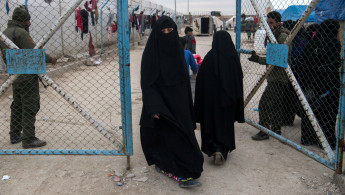Australia to ban return of citizens who fought for Islamic State
Australia is set to pass laws that would allow the government to prevent suspected extremists from returning home for up to two years, as Australian supporters of the Islamic State group are demanding to be repatriated from crowded Syrian refugee camps.
The bills based on British law were debated in the Senate on Wednesday after they were passed Tuesday night in the House of Representatives where the conservative government holds a majority.
The centre-left Labor Party opposition wants the legislation made more consistent with the British model with amendments that would allow a judge rather than Home Affairs Minister Peter Dutton to decide which Australians are banished. But the opposition supported the legislation in the House, indicating that their misgivings were not sufficient to attempt to block its passage.
The legislation could be passed into law as early as Thursday.
Dutton argues he needs the flexibility to act quickly to prevent extremists returning.
He also argues that some of Labor's proposed amendments set the threshold for preventing Australians from returning too high.
Read more: How will Europe deal with returning Islamic State group fighters?
The so-called Temporary Exclusion Order was "designed to ensure that authorities can manage these returns in a way that keeps the Australian community safe," Dutton told Parliament.
The Law Council of Australia, the nation's leading advocacy for lawyers, on Wednesday questioned whether the proposed law was constitutional and urged the Senate to refer the bill to a parliamentary committee for review.
"Protecting the safety and security of the Australian people must always be the paramount concern of government. But rushed laws at risk of constitutional challenge pose an unnecessary risk to national security," council president Arthur Moses said in a statement.
"The Australian people must be able to have confidence that public safety and the work of our intelligence and law enforcement agencies is protected by laws and powers that are strong, proportional and without legal ambiguity," Moses added.
Parliament is debating the law change as aid groups estimate that at least 50 Australian women and children have been stranded in overcrowded Syrian refugee camps following the loss of Islamic State's territory in the Middle East.
Australia announced a month ago its first organized repatriation from the conflict zone, when eight Australian offspring of two slain Islamic State group fighters were moved from the al-Hol camp in north-eastern Syria across the border to Iraq.
Rob Stary, a lawyer who represents 18 Australian women and children among the 65,000 refugees at al-Hol, said he will initiate Australian Federal Court action against the government unless it repatriates his clients.
Stary said some of his clients accepted they could be imprisoned in Australia under laws that make just traveling to the former Islamic State group stronghold of al-Raqqa a crime.
Being ordered to stay out of Australia for two years put his clients at risk, Stary said.
"The risk is that they'll continue to be radicalized, they certainly won't get the same medical treatment that one would expect if they've been injured, and they'll be certainly subject to the risk of further assault — particularly women, of sexual assault," Stary said.
Dutton said his government would look at repatriating Australians case by case, particularly where young children were involved.
"There are some women within the group who would pose a significant security threat to our country," Dutton said. "These are not innocent women who have taken their children into the theatre of war — we're talking about some very difficult cases here, some people who would cause us harm."
Follow us on Twitter: @The_NewArab





 Follow the Middle East's top stories in English at The New Arab on Google News
Follow the Middle East's top stories in English at The New Arab on Google News
![The UAE is widely suspected of arming the RSF militia [Getty]](/sites/default/files/styles/image_330x185/public/2024-11/GettyImages-472529908.jpg?h=69f2b9d0&itok=Yauw3YTG)
![Netanyahu furiously denounced the ICC [Getty]](/sites/default/files/styles/image_330x185/public/2024-11/GettyImages-2169352575.jpg?h=199d8c1f&itok=-vRiruf5)
![Both Hamas and the Palestinian Authority welcomed the ICC arrest warrants [Getty]](/sites/default/files/styles/image_330x185/public/2024-11/GettyImages-2178351173.jpg?h=199d8c1f&itok=TV858iVg)